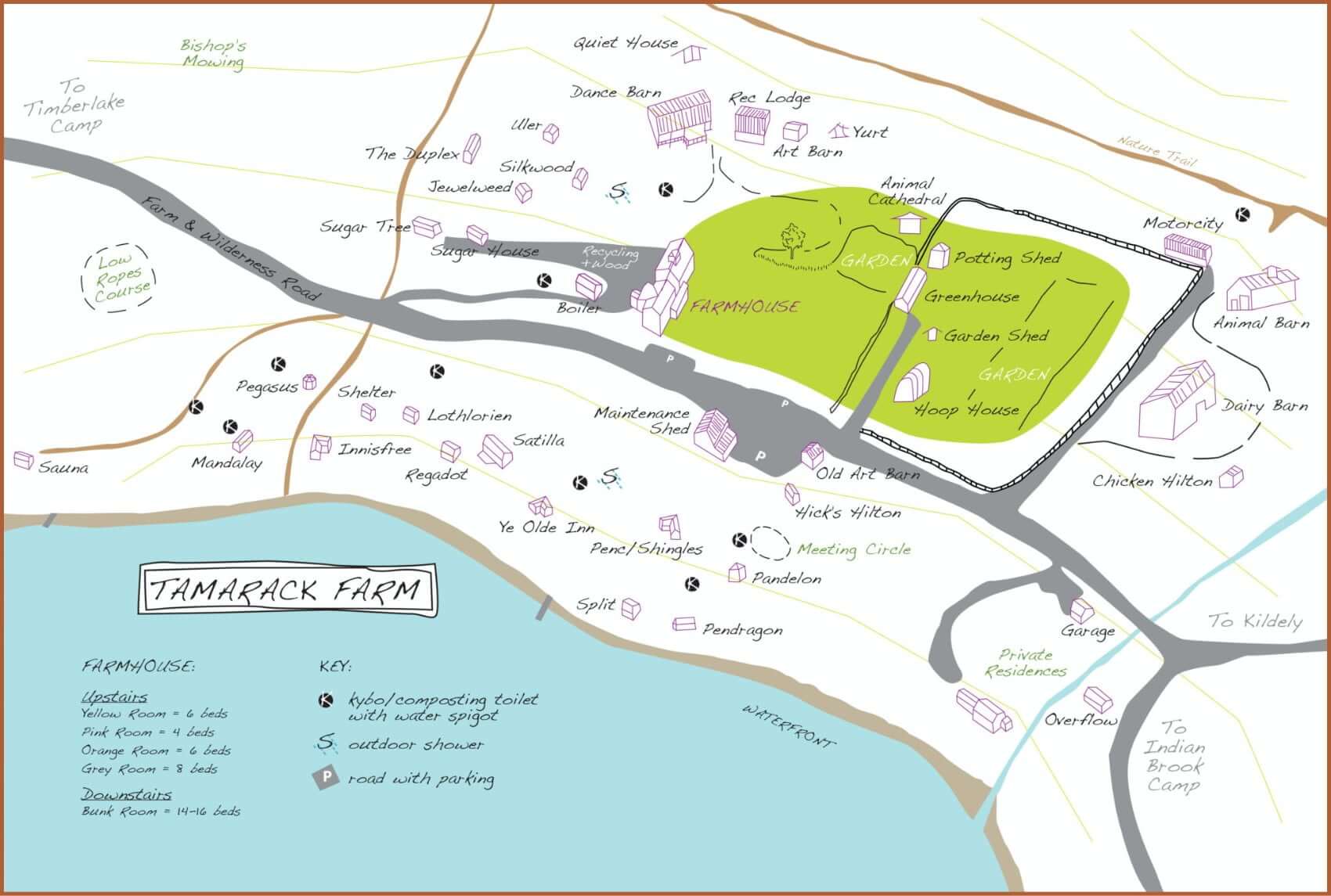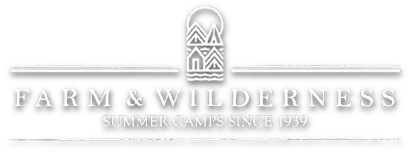TAMARACK FARM
MIXED GENDER
AGES 15-17
COMMIT TO IMMERSION
Creating Community and Meaning
Kate Kyros is a former camp counselor, leadership educator, wilderness trip leader, school administrator, and therapist. Kate grew up with a strong connection to both farms and wilderness and is surprised it took her well into adulthood to find her way to F&W! In her own words, “I believe magic happens when we are in community, immersed in the natural world, and doing meaningful work.”
Kate holds an interdisciplinary BA in psychology, gender studies, and farming from Hampshire College, and an MSW from Smith College School for Social Work. She completed two years of post-masters study with The Mill River Institute for Dialogic Practice. Kate is an avid gardener, an aspiring meditator, and mother to two often-muddy children. When not at F&W, Kate calls Western Massachusetts home. Kate loves facilitating growth experiences and is excited to do so at F&W with our teens!

| Session 1: | Wednesday, June 24 - Thursday, July 16 |
| Session 2: | Sunday, July 19 - Sunday, August 9 |
Housing: Tamarack Farmers begin each morning with an uninterrupted view of the woods, surrounded by peers. The cabins are all open three-sided wood structures with individual bunks and storage for each camper. As we build community, it’s important each camper still has their space and campers enjoy personalizing their bunk. Cabin groups are based on gender, with more options for gender non-binary youth.
Facilities: Shared facilities are nearby for all their personal hygiene needs, including fresh water and hot showers.

WHAT OUR CAMPERS SAY

WHY THE FARM?
OUR APPROACH
Tamarack offers teens the opportunity to gain a deeper sense of confidence through meaningful work and face-to-face discussions. Given a chance to step up, our teens are trusted to act, envision and take ownership of projects in a non-competitive way. Together, they tackle new challenges as they build rafters for a new cabin or harvest beets.
Tamarack Offers Exciting Possibilities to Explore.
Dive into creating your summer community. Tamarack Farm campers share responsibilities, assume leadership roles and find growth opportunities in important issues as they explore issues of peace and justice and environmental sustainability.
Campers will spend their days in one of five areas: Environmental Sustainability, Carpentry and Construction, Artists in Residence, Agriculture and Homesteading, and the Counselor Apprenticeship Program.
Campers assist and take leadership roles in:
• Farm management
• Building projects
• Harvesting and delivering food and milking cows.
• Creating art for the soul or beautifying the camp community
• Invasive species control with the lake associations and trail design and maintenance.

EXPERIENCE LIFE IN THE OUTDOORS
Activities
Complete meaningful projects as a result of your commitment.
Environmental Sustainability (Eco)
The Eco Immersion is all about the noble pursuit of taking care of land (and steering clear of a desk job) for our young conservationists. Hands on projects build foundational skills in forestry, trail interpretation & maintenance, water quality testing, watershed & habitat exploration, native and invasive plant species identification, land use ethics & history, community science projects, navigating the woods, and more. The Farm & Wilderness camps are surrounded by thousands of acres of forestland and this crew will explore these conserved areas while gaining a deeper sense of place within the landscape and watershed here in Vermont. The conservationists might spend their morning canoeing to the floating bog on our Woodward Reservoir to take an inventory of the plant life or hike the sugarbush to take sugar maple measurements. There will be opportunities to meet guest experts and explore conserved areas of VT and NH. This immersion is for campers who want to discover connections and belonging within the forests and waters of Vermont and beyond the camp areas. There is a place both for physical work and careful analytics in this immersion - getting your back and your brain into it!
Construction and Carpentry (C&C)
This summer the C&C Immersion will design and build a cabin from the ground up and remodel two older cabins at Tamarack Farm. The carpenters in this immersion meet virtually before camp with the project lead to co-create a custom design that accounts for camp aesthetic, available materials, use of space and light, camp/ camper needs, as well as the limiting factors of building at camp. In the first days our carpenters begin to build the foundational carpentry and construction skills to work safely and effectively at a wilderness jobsite. After a bit of practice with those skills, it’s off to build a cabin in the woods!
Artists in Residence
The Arts Immersion is a creative space to explore the self and the world. No prior artistic experience is needed. We focus on sustainable materials and practices, reuse and repurposing, and reimagining our world. Artists learn about taking perspectives, building community through the arts, and storytelling. Subjects and inspirations for artist’s work at camp are often the immediate surroundings (particularly the farm) creating an enhanced appreciation of the environment, sense of shared space, and a connection to the land. We work in a multitude of mediums, which may include bookbinding, printmaking, textiles and fiber arts, puppetry, sculpture, muraling, and still life sketching. Be prepared to stretch: each summer session will have single day experimentations in some mediums as well as in-depth explorations in others, and also include both independent and collaborative projects. The studio may be visited from time to time by multiday in-residence or one-day guest artists who bring a unique project to the group. Artists often engage in service to the greater F&W community by carving or painting signs for other camps. Work is displayed at the end of each term as we open up the MoFA (Museum of Farm Arts) exhibits to the community. It is a messy and wild and beautiful way to spend a summer!
Agriculture and Homesteading
Our Agriculture and Homesteading (Ag) Immersion will be focused on running a small farm. Farmers in this immersion maintain the greens garden, learn homesteading skills, and are responsible for the farm animals. This includes the care and daily milking of our cows, weekend care and milking of the Barn Day Camp goats, daily care of the meat chickens. We also house animals from the other camps who are in need of extra care. Farmers take the lead in managing and supporting their peers during afternoon harvests as part of the TF Daily Greens operation, which supplies our whole camp with daily salad and sauté greens. Homesteading projects may include making yogurt, cheese, and kefir with the milk from our dairy, pickling and preserving, or a variety of non-food-related things like candle making. Farmers learn about regenerative agriculture, eco system support, food systems, and food justice. We’ve got incredible professional farm educators leading the program. The Ag Immersion is dynamic and badass and the teen farmers working here take ownership and practice community leadership!
Counselor Apprenticeship Program (CAP)
The CAP Immersion prepares apprentices for life as a camp counselor with hands on training and experience. Campers in this immersion live at Tamarack Farm but spend much of their time working with the youngest campers at Firefly Song or Timberlake, often departing after the TF morning routine and returning by dinner. While assigned to a rotating duty area, expect to have instruction and guidance as well as latitude and discretion in how to meet duties, whether it is leading a song, running an activity or game, or supervising a group. Apprentices set personal development goals and receive timely feedback on their progress. The program has a wide variety of elements and apprentices may learn to instruct outdoor living skills or even have the opportunity to become a certified lifeguard. Training includes how to plan and run activities, how to support kids struggling with challenging behavior, and how to create camp magic. Apprentices also learn about adolescent development, creating camp culture, upstander intervention strategies, safety protocols, creating community, and how to be a dependable camp colleague. The CAP Immersion runs both sessions. A camper can either choose a single session or attend the full summer program, which includes advanced leadership opportunities in Session 2 for campers who complete Session 1. Apprentices leave with valuable training and work experience in addition to an amazing camp experience!



HAVE QUESTIONS?




